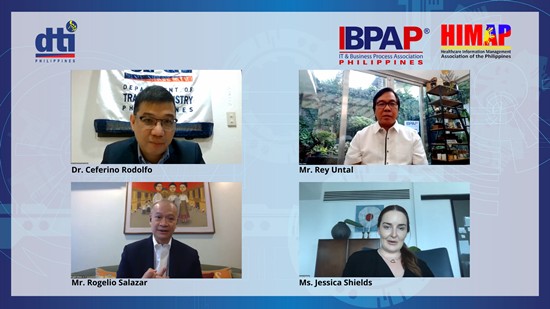Philippine IT-BPM
sector to expand delivery of services to US clients post COVID-19

By
DTI-Foreign Trade
Service Corps
July 7, 2020
MANILA – DTI
Undersecretary and Board of Investments (BOI) Managing Head, Dr.
Ceferino Rodolfo, and key officials of the Philippine IT and
Business Process Management (IT-BPM) industry reached out Wednesday,
01 July 2020, to stakeholders in the Americas region, highlighting
projected growth and expanded opportunities, and citing the
industry’s resilience during the COVID-19 pandemic.
During the webinar
organized by the Philippine Trade and Investment Centers in
Washington DC, New York, San Francisco, Los Angeles, Toronto and
Mexico City, jointly with the Manila-based Foreign Trade Service
Corps, the Export Marketing Bureau and the Board of Investments,
Undersecretary Rodolfo and the private sector representatives
tackled how the Philippine IT-BPM industry, capably continued
supporting the IT-enabled back-office requirements of overseas
businesses in North America. During the imposition of the Enhanced
Community Quarantine (ECQ) in the country, the IT-BPM sector
provided virtually uninterrupted support to global clients,
especially those in the healthcare sector, which operated at a 90%
capacity.
Undersecretary Rodolfo
credited the Philippines’ solid economic fundamentals for cushioning
the impact of the pandemic on the country’s recovery efforts. He
shared that the Philippines recorded strong pre-Covid economic
growth performance averaging at 6.6 percent and posted a relatively
low average inflation rate of 3 percent from 2016 to 2019, and a
strong fiscal position with a highest revenue-to-GDP ratio revenue
(16.1 percent) and lowest debt-to-GDP ratio of (39.6 percent) since
1997 for 2019. The prospects for Philippine growth show a sharp
V-shaped recovery by 2021, with a growth range of 7.1 to 8.1 percent
and expanded opportunities for the IT-BPM sector.
“Our registered approved
investments have actually risen. In the first half of 2020, our
record shows that we are 112% higher in terms of approved
investments compared to the same period last year. Most of these
investments have gone to infrastructure, energy, and transport –
very important sectors when you look at the modernization of the
Philippine economy,” Undersecretary Rodolfo said.
Undersecretary Rodolfo
cited the 60,000-kilometer nationwide fiber optic network
nationwide, manufacturing support facilities, a third a telecom
player, and satellite-based connectivity solutions with high-degree
local manufactured content as strategic projects that will support
the projected rebound in 2021.
IT & Business Process
Association of the Philippines (IBPAP) President and CEO Rey Untal
highlighted that 2019 was a strong year for the IT-BPM industry,
growing by 5.8 percent in Full-time Equivalent (FTE) headcount and
7.1 percent in revenues, despite the challenges brought about by
geo-political developments and disruptive technologies such as
Artificial Intelligence/Intelligent Automation.
“Growth in 2019 was
driven, in part, by incumbent third-party operators that continued
to expand. We saw a bit of expansion in healthcare,” he added.
“Likewise, we saw a number of multinational global in-house centers
(GICs) investing and/or expanding in the Philippines. Lastly, if we
look at the creative sectors, specifically animation and gaming,
they’ve had their fair share of growth as well.”
Mr. Untal credited the
government, including the DTI, BOI, and Philippine Economic Zone
Authority (PEZA), for including the BPO sector as among those
recognized by the government’s COVID-19 Inter-Agency Task Force as
essential businesses that were allowed exemptions during the ECQ
period. “That allowed us to operationalize two work streams: the
on-site skeletal model, as well as the work-from-home capability,”
he said.
Healthcare Information
Management Association of the Philippines (HIMAP) President Rogelio
Salazar Jr. shared that 80 percent of HIMS businesses achieved
on-site productivity levels, with GICs achieving 80-90 percent
productivity and quality levels within three to four weeks from the
start of the ECQ period.
Mr. Salazar also said that
the HIMS (health information management services) segment of the IT-BPM
industry is expected to post the highest revenue and FTE headcount
growth range for 2019 to 2022, showing its strength as a high-value
contributor to the national economy. “Over the next few years, we
foresee the HIMS sector in the Philippines continuing to grow at a
much faster rate than the IT-BPM industry as a whole. That growth
will primarily be led not only by third-party players but also more
GICs looking at the Philippines for redundancy, scalability and
adaptability in their operations,” he added.
Jessica Shields, head of
International Business Operations of Dexcom Philippines, Inc., cited
talent availability, labor arbitrage, and cultural fit as factors in
Dexcoms’s decision to establish operations in the Philippines. She
also highlighted the strategic partnership between industry and the
government, enabling the sector to thrive even during the pandemic.
Dexcom, headquartered in Silicon Valley, California, invested in GIC
operations in Taguig in January 2019, and is one of the world
leaders in diabetes care technology.
Ninety-five participants
from North America and other parts of the world attended the webinar,
while the Facebook Live video garnered almost 5,000 views as of this
writing.